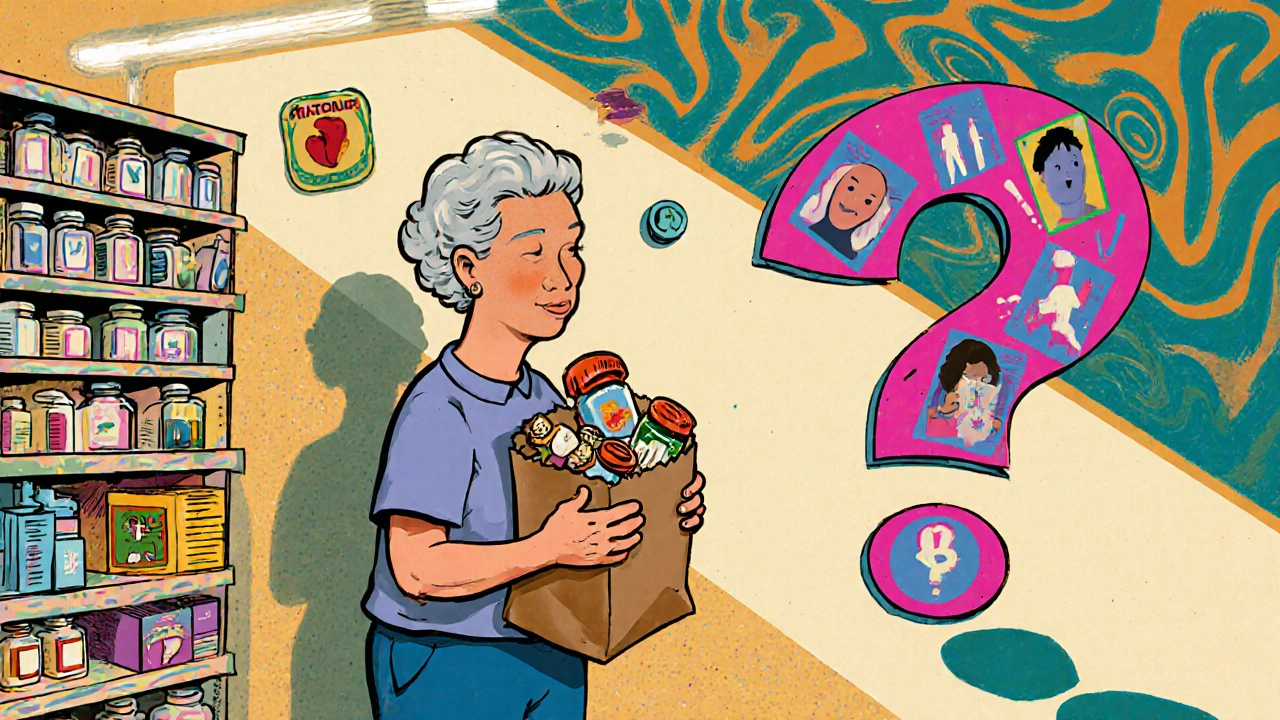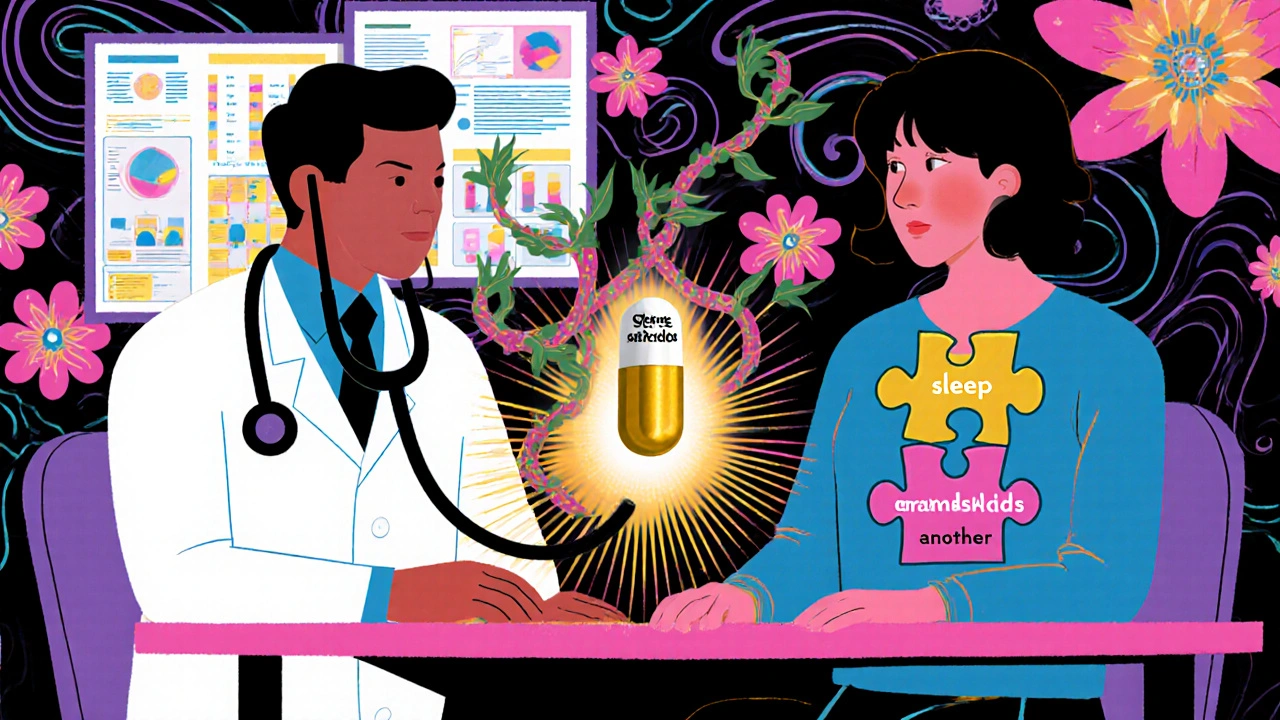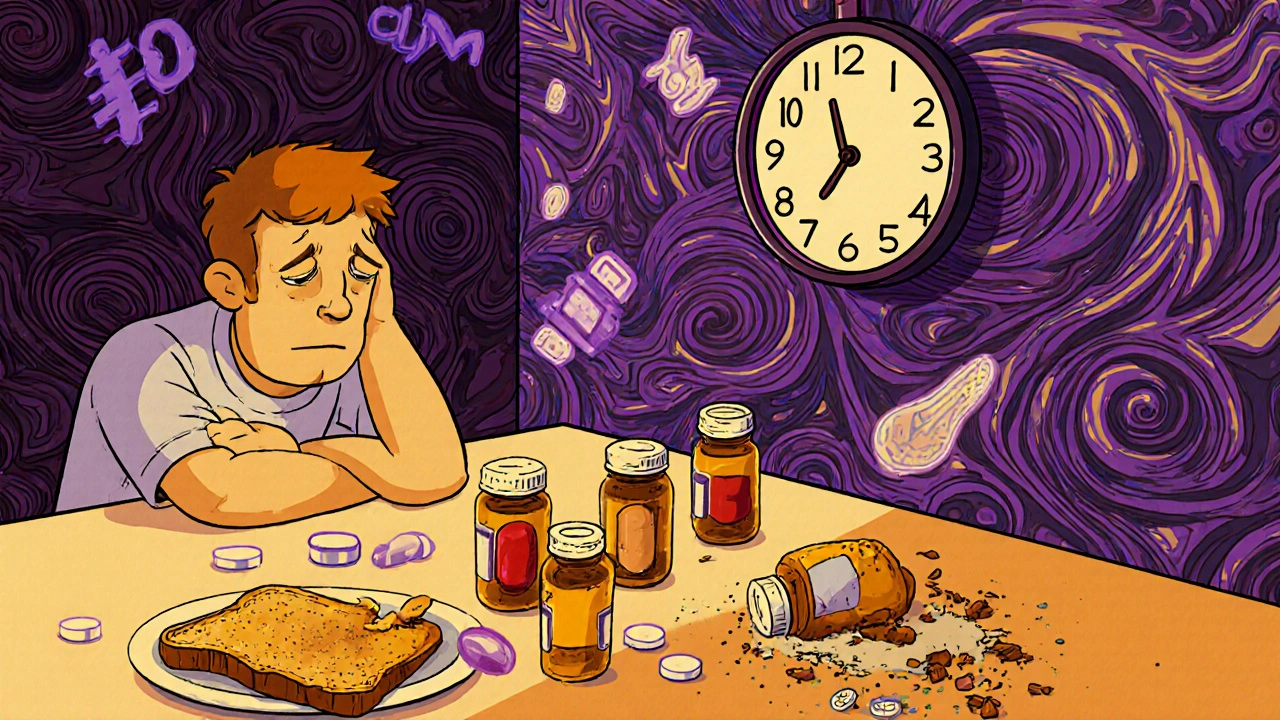Medication Adherence Estimator
How Well Are You Sticking to Your Medications?
This tool estimates your adherence rate based on your medication regimen and side effects. Remember: adherence isn't about perfection, but about finding a sustainable balance between treatment and quality of life.
Why Taking Your Pills Isn’t as Simple as It Sounds
You’ve got a prescription in your hand. Your doctor says it’ll save your life. But every morning, you stare at those pills and wonder: Is this worth it?
It’s not laziness. It’s not rebellion. It’s real life.
Half of people with chronic conditions don’t take their meds as prescribed. Not because they’re careless - but because the cost, the side effects, the daily chaos of managing multiple pills, and the quiet sacrifice of their normal life make it unbearable. The World Health Organization calls this adherence, not compliance. That’s important. Compliance means obeying. Adherence means choosing - even when it hurts.
And here’s the hard truth: Drugs don’t work in patients who don’t take them. But they also don’t work if taking them makes you feel worse than the disease.
The Hidden Cost of Perfect Adherence
Doctors talk about hitting 80% adherence - meaning you take your meds at least 80% of the time. That sounds reasonable. But what does that look like in practice?
Imagine you’re on three pills a day for high blood pressure, diabetes, and cholesterol. Each one has side effects: dizziness, stomach cramps, constant fatigue. You’re supposed to take them at breakfast, lunch, and dinner. But your job starts at 5 a.m. You’re already running late. You skip the lunch pill because you’re at a meeting. You forget the evening one because you’re too tired to stand up. By Friday, you’re at 65%. Your doctor calls you non-adherent. You feel guilty. But you’re not failing - your treatment plan is.
Studies show that for every extra pill you have to take daily, adherence drops by 26%. A three-times-daily regimen? That’s over 50% less likely to stick than a once-daily one. And it’s not just numbers. Real people skip doses before family dinners because diuretics mean constant bathroom trips. They cut back on pain meds before a birthday party so they can hug their grandkids without nodding off. These aren’t mistakes. They’re survival tactics.
Side Effects That Steal Your Days
Not all side effects are listed on the label. Some are too personal to mention.
One in four people with chronic illness say they’ve skipped or reduced their meds because of how they made them feel. Gastrointestinal issues? 28% of patients say yes. Drowsiness? 24%. Sexual dysfunction? 19%. These aren’t rare side effects - they’re deal-breakers.
A study of over 15,000 patients found that 42% adjusted their regimens to protect their daily quality of life. One man with rheumatoid arthritis switched from daily pills to a weekly injection. His adherence jumped from 55% to 92%. Why? Because he could finally plan his life around his meds - not the other way around.
And it’s not just physical. The mental toll is heavier than most realize. Patients who believe their meds are necessary but doubt they’ll help? Their adherence drops by 35%. That’s not ignorance. That’s exhaustion. That’s the quiet realization: I’m taking this for a future I might not get to enjoy.

It’s Not Just You - The System Is Broken
Blaming patients for non-adherence is like blaming someone for falling off a broken ladder.
The American Heart Association found that only 30% of adherence issues come from the patient. Another 20% are from doctors - rushed appointments, poor communication, no follow-up. The biggest chunk - 30% - comes from the system: cost, access, complexity. And 20%? That’s society - poverty, transportation, literacy, isolation.
One in four Americans skip doses because they can’t afford the pills. Rural patients miss refills because the pharmacy is 40 miles away. Elderly patients forget because their vision’s fading and their hands shake. And when they go to their doctor, they’re told to “just take them.”
That’s not care. That’s neglect dressed in white coats.
What Actually Works - Real Solutions, Not Just Warnings
There are fixes. But they’re not about shaming people into taking more pills. They’re about making the plan fit the person.
1. Simplify the regimen. One pill a day beats three. Monthly injections beat daily pills. Switching from multiple drugs to a single combination pill can boost adherence by 28%. Ask your doctor: “Can this be simpler?”
2. Talk about side effects - early and honestly. Don’t wait until you’re miserable. Say: “I’m worried about the drowsiness. Is there another option?” Providers who use motivational interviewing - asking open questions instead of giving orders - see 24% better adherence.
3. Use tools that fit your life. Pill organizers help - but only if you can set them up. Digital apps like Medisafe remind you - but 72% of people over 65 quit using them after three months. Find what works for you, not what sounds techy.
4. Do a Brown Bag Review. Bring all your meds - vitamins, OTC pills, supplements - to your next appointment. Doctors find adherence issues in 63% of cases this way. You’d be surprised what’s hiding in that bag.
5. Negotiate flexibility. Can your insulin be taken after meals instead of before? Can your blood pressure pill be moved to the evening if it makes you dizzy in the morning? Many providers will say yes - if you ask.

When the Benefits Don’t Outweigh the Cost
Here’s the most uncomfortable truth: Sometimes, the treatment does more harm than good.
Take an 80-year-old with mild high blood pressure who’s on five pills a day. She’s dizzy, constipated, and can’t sleep. Her BP is 140/85 - not dangerous, just above normal. Is she better off taking all the pills? Or is she better off feeling alive, even if her numbers aren’t perfect?
There’s no one-size-fits-all answer. That’s why shared decision-making matters. It’s not about doing what the guidelines say. It’s about asking: “What matters most to you?”
Some people want to live longer, no matter what. Others want to live well - today. Both are valid.
The FDA now requires drug companies to study how side effects impact patients’ daily lives. That’s progress. But real change happens when your doctor asks: “How are you feeling - not just your numbers?”
What You Can Do Right Now
- Write down your top three side effects. Don’t just say “I feel bad.” Say: “I’m too tired to play with my kids after lunch.” “I can’t go out because I’m always rushing to the bathroom.” Be specific.
- Ask: “Is there a simpler version?” Even one less pill a day can change everything.
- Request a medication review. Ask your pharmacist or doctor to go through everything you take - together. You’ll likely find duplicates, unnecessary drugs, or better timing options.
- Set one small goal. “I’ll take my morning pill every day for two weeks.” Not “I’ll take all my pills perfectly.” Small wins build confidence.
- Find your tribe. Online communities like Reddit’s r/ChronicPain or PatientsLikeMe aren’t just venting spaces. They’re where people share real workarounds: “I take my pain meds after dinner so I’m not groggy for morning meetings.”
Final Thought: Your Life Matters More Than Your Numbers
Medication adherence isn’t about perfection. It’s about partnership.
You’re not failing if you miss a dose. You’re not weak if you choose to feel human over a lab result. The goal isn’t 100% adherence. The goal is sustainable care - care that lets you live, not just survive.
Your doctor’s job isn’t to make you obey. It’s to help you choose - wisely, safely, and with your whole life in mind.
So next time you look at those pills, ask yourself: What am I giving up - and what am I gaining? Then ask your doctor the same question. That’s where real healing begins.
What is considered good medication adherence?
Good adherence is generally defined as taking at least 80% of your prescribed doses over a given time period. This is called the 80/80 rule - 80% of doses taken over 80% of days. But this isn’t a universal goal. For some people, 70% adherence with better quality of life is a better outcome than 90% adherence with severe side effects. The key is working with your provider to find your personal target.
Can I stop taking my meds if the side effects are too bad?
Never stop abruptly without talking to your provider - some medications can cause dangerous withdrawal effects. But you absolutely can and should speak up about side effects. Many drugs have alternatives with fewer side effects. Others can be taken at different times of day or switched to long-acting forms. Your provider can’t help if you don’t tell them what’s going on.
Why do some people take their meds and others don’t?
It’s not about willpower. People who stick to their meds often have simpler regimens, lower costs, better support, or providers who listen. Those who struggle usually face a mix of financial stress, complex schedules, unmanaged side effects, or feeling unheard. It’s rarely about laziness - it’s about fit. If your treatment doesn’t fit your life, it won’t last.
Do pill organizers really help?
Yes - for some. Pill organizers improve adherence by about 22% for people on multiple daily meds. But they only work if you can set them up and keep up with them. For people with shaky hands, memory issues, or no help at home, they can add stress. If you’re struggling, ask your pharmacist about blister packs or automated dispensers - some are designed for seniors or people with disabilities.
Is it okay to skip a dose before a big event?
Many people do - and for good reason. Skipping a diuretic before a family dinner or reducing pain meds before a wedding is a common, rational choice. But don’t do it alone. Talk to your provider about timing adjustments. Maybe your diuretic can be moved to the morning. Maybe your pain meds can be switched to a longer-acting version. The goal isn’t to punish yourself for wanting to enjoy life - it’s to find a plan that lets you have both.
How do I know if my treatment plan is right for me?
Ask yourself: Do I feel worse taking the meds than I do without them? Am I missing out on things I love because of side effects? Do I understand why each pill is here? If you answer yes to any of these, your plan may need tweaking. Good treatment doesn’t just control disease - it lets you live. If it doesn’t, it’s time to revisit your options.

Dana Dolan
November 19, 2025 AT 18:17It’s not about being perfect. It’s about being alive.
Angela Gutschwager
November 20, 2025 AT 14:52Andy Feltus
November 20, 2025 AT 23:28It’s like giving someone a 50-pound backpack and saying, ‘Walk 10 miles daily - and don’t complain about the blisters.’
Adherence isn’t a moral failing. It’s a design flaw. And the design? It’s rigged.
Dion Hetemi
November 22, 2025 AT 11:39People who say ‘I feel worse on the meds’ are just lazy and don’t want to face the truth. If you’re not willing to suffer a little for longevity, you’re not serious about living.
Also, why are we letting people skip doses before ‘family dinners’? That’s not living - that’s self-indulgent nonsense.
Kara Binning
November 22, 2025 AT 12:20WHO DO YOU THINK YOU ARE, TELLING PEOPLE THEY CAN SKIP THEIR MEDS?! THIS IS A DISGRACE TO AMERICA.
MY DAD TOOK HIS PRESCRIPTIONS EVEN WHEN HE COULDN’T WALK. HE DIDN’T CARE ABOUT ‘QUALITY OF LIFE’ - HE WANTED TO LIVE.
IF YOU CAN’T HANDLE A LITTLE DROWSINESS, YOU’RE NOT A REAL PATIENT. YOU’RE A WHINER.
THEY SHOULD MAKE THESE KINDS OF ARTICLES ILLEGAL.
river weiss
November 23, 2025 AT 23:09For example, switching from thrice-daily dosing to once-daily extended-release formulations can improve adherence by up to 35%, per JAMA Internal Medicine (2021).
Pharmacists are underutilized in this space - medication therapy management (MTM) programs have shown 24% improvement in adherence when patients receive structured counseling.
Also, consider that 68% of patients who use pill organizers discontinue them within 90 days due to poor ergonomics or cognitive load.
What’s needed isn’t more guilt - it’s human-centered design in medication delivery.
And yes - brown bag reviews should be standard of care. Every single time.
Brian Rono
November 25, 2025 AT 10:33Let me guess - you also think people should be allowed to skip insulin because ‘it makes them feel like zombies’?
Here’s the truth: medicine isn’t a buffet. You don’t get to pick and choose side effects like they’re appetizers.
And don’t give me that ‘system is broken’ crap. The system works fine for people who aren’t selfish.
It’s not about ‘fitting the plan to the person’ - it’s about the person fitting into the plan.
Otherwise, we’re just handing out candy to diabetics and calling it ‘compassion.’
seamus moginie
November 27, 2025 AT 08:15My hands shake so bad I can’t open pill bottles. My eyes can’t read the tiny print. My bus doesn’t come on Tuesdays so I can’t get my refill.
And when I go to the doc? They say ‘just take them.’
So I do. Sometimes. And I feel guilty.
But I’m still here. And I’m still trying. That counts.
Zac Gray
November 28, 2025 AT 13:52I switched from three pills a day to a combo pill. My dizziness vanished. I started sleeping. I went back to hiking.
My doctor didn’t even ask if I wanted to simplify. I had to push.
So if you’re struggling? Don’t blame yourself. Ask: ‘Can this be easier?’
And if your provider says no - get a new one.
Your life isn’t a spreadsheet. It’s your life.
And yes - I took my pill today. And I’m proud of that.
Steve and Charlie Maidment
November 29, 2025 AT 23:04He doesn’t have a fancy app. Doesn’t have a pill organizer. Doesn’t have a supportive family. Just grit.
And he’s alive.
So when you say ‘my plan doesn’t fit my life,’ ask yourself: is it really the system? Or are you just not willing to do the hard thing?
Because I’ve seen people do harder.
And they didn’t get a Reddit post to validate it.